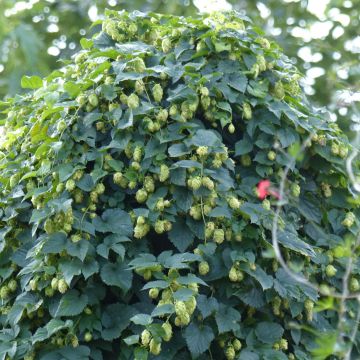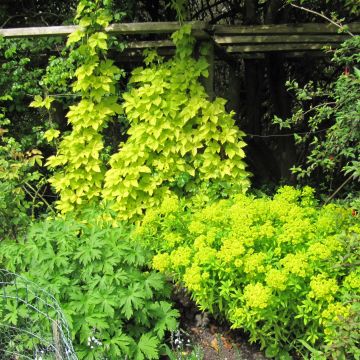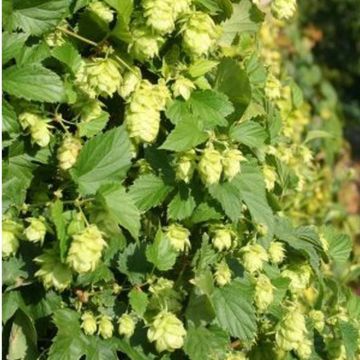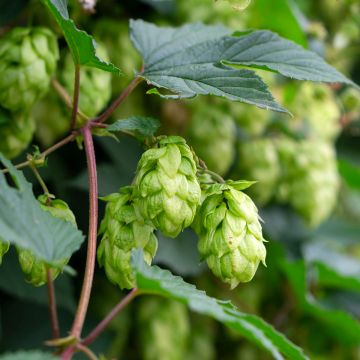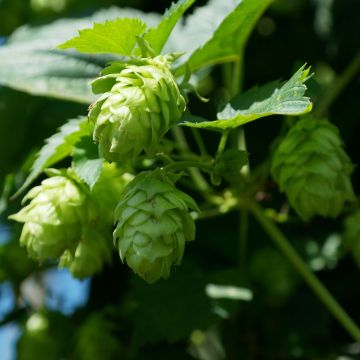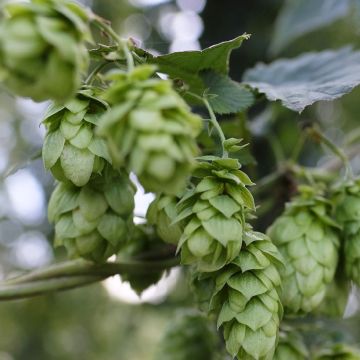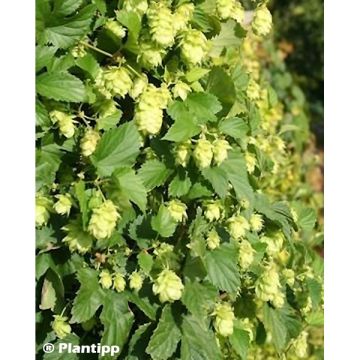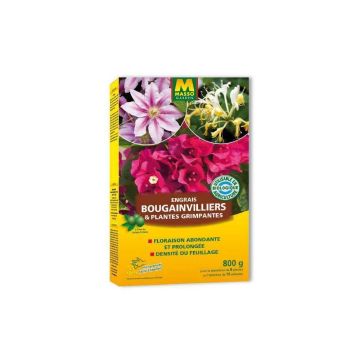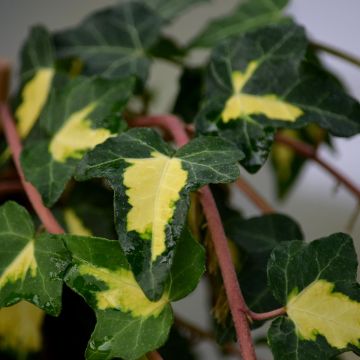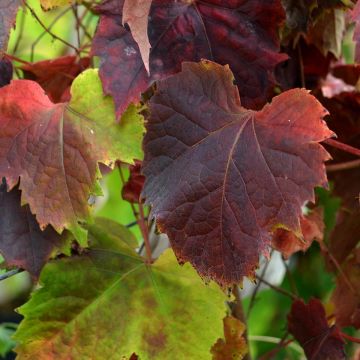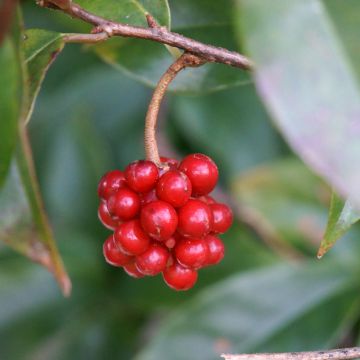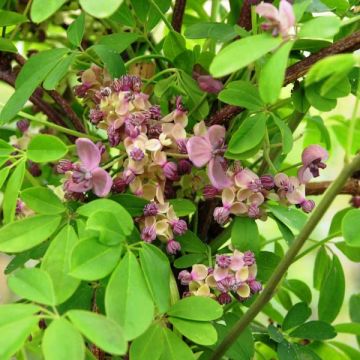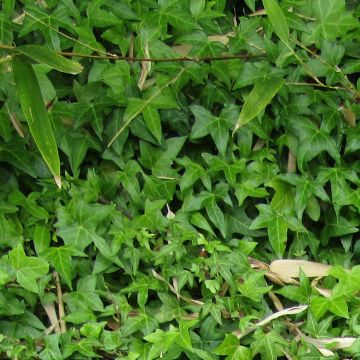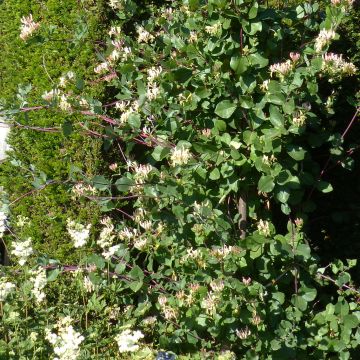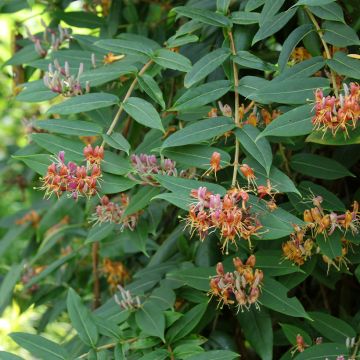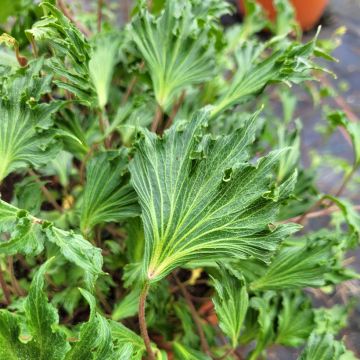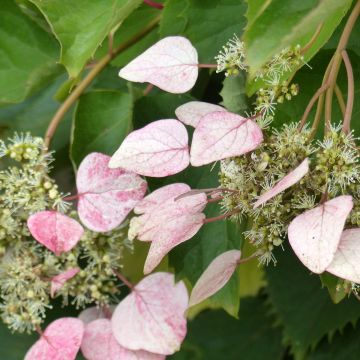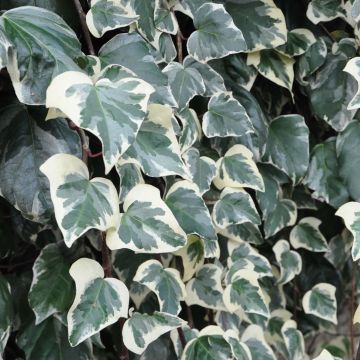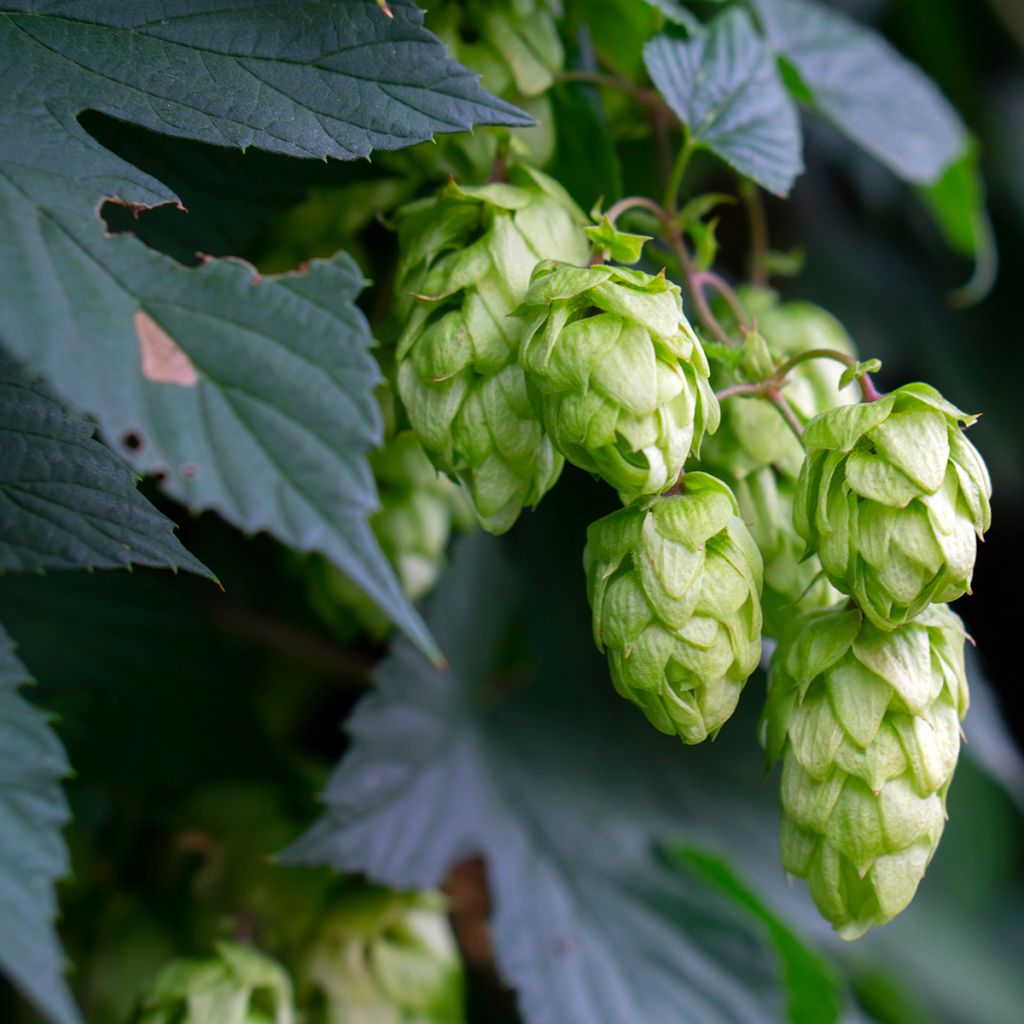

Humulus lupulus Hersbrucker - Common Hop
Humulus lupulus Hersbrucker - Common Hop
Humulus lupulus Hersbrucker
Hop, Common Hop
Why not try an alternative variety in stock?
View all →This plant carries a 12 months recovery warranty
More information
We guarantee the quality of our plants for a full growing cycle, and will replace at our expense any plant that fails to recover under normal climatic and planting conditions.
From €5.90 for pickup delivery and €6.90 for home delivery
Express home delivery from €8.90.
Does this plant fit my garden?
Set up your Plantfit profile →
Description
Humulus lupulus 'Hersbrucker' is a variety of pleasantly aromatic female hop, selected in Germany for brewing beer. Its green cones, harvested in summer, give the beer a balanced aroma, both fruity, spicy and floral. It is commonly used in Germany, and this variety is now making its way among English brewers. The cones can also be used to make sedative and soothing herbal teas or in pillows for their soothing properties. This vigorous deciduous vine, hardy and perennial by its stump, is also appreciated for its beautiful luxuriant foliage, reminiscent of that of the vine. In ornamental gardens, hops are perfect for embellishing and quickly hiding any unsightly support.
Humulus lupulus belongs to the Cannabaceae family, just like hemp and the hackberry. It is native to Europe, temperate Asia, and boreal Africa where it inhabits cool and humid places. It is a perennial herbaceous vine with a large fleshy root that regenerates its entire above-ground vegetation each year and rests underground during the winter. It is a powerful plant that can spread through suckers. Hops are a dioecious plant, meaning that there are male and female plants. Only the female plants are used to make beer. 'Hersbrucker', originally selected for its resistance to verticillium wilt, is a female variety whose inflorescences in the form of cones are harvested.
The 'Hersbrucker' hop develops herbaceous and voluble stems in spring, emerging from the slightly suckering stump, quickly entwining any support available. Their growth is very rapid, reaching approximately 6 to 8m (20 to 26ft) in one season. An adult plant will therefore occupy about 7m (23ft) in height and 1.50m (5ft) in spread. They have a quadrangular section and bear rough, beautifully cut leaves with 3 to 5 pointed, dentate lobes. The colour of the leaves is a bright green. The female inflorescences appear in summer, from June to August depending on the climate. They are green catkins that will take the form of cones. Oval-shaped, these cones have a scaly appearance, they are acid green in colour when ripe and covered with a fragrant and powdery resin called lupulin, which gives bitterness to beer. They are usually harvested in September.
In ornamental gardens, the 'Hersbrucker' hop is an excellent complement to a wisteria or a Virginia creeper. These vigorous and carefree climbing plants flower in spring for the former and colour the foliage in autumn for the latter. It will breathe new life into an old tree, conceal a tired garden shed or an unsightly structure, and enhance a pergola or a fence. The flowers, picked in September, make beautiful dried bouquets.
The female inflorescences, the cones, have been used to flavour beer since the 8th century. Previously, hops were only used to ensure the preservation of beer. Currently (despite modern preservation technologies), this tradition has remained for the slight bitterness and flavour that hops bring. Its young voluble stems can also be consumed in the same way as asparagus.
Report an error about the product description
Flowering
Foliage
Plant habit
Botanical data
Humulus
lupulus
Hersbrucker
Cannabinaceae
Hop, Common Hop
Cultivar or hybrid
Other Humulus - Hop
Planting and care
The 'Hersbrucker' hop is easy to grow in deep soil and can tolerate all exposures with a preference for partial shade. This variety tolerates sunny exposures quite well, except in very hot regions. The plant shows a preference for clay-limestone and highly fertile soils, rich in humus, that do not dry out too much in summer. Provide it with a good base fertilizer at planting. It attaches itself thanks to the small hooks present on the voluble stems. Install a trellis or long sturdy wires if you want to cover a wall, help them at the beginning to grow in all directions to evenly cover their support. The stems easily detach from their support in autumn, as they dry out and die with the first frost. Prune your plant every year to 25cm (10in) in height, in February or March; remember to remove (and possibly replant) the shoots that would otherwise become invasive.
Planting period
Intended location
Care
This item has not been reviewed yet - be the first to leave a review about it.
Shade-loving climbers
Haven't found what you were looking for?
Hardiness is the lowest winter temperature a plant can endure without suffering serious damage or even dying. However, hardiness is affected by location (a sheltered area, such as a patio), protection (winter cover) and soil type (hardiness is improved by well-drained soil).

Photo Sharing Terms & Conditions
In order to encourage gardeners to interact and share their experiences, Promesse de fleurs offers various media enabling content to be uploaded onto its Site - in particular via the ‘Photo sharing’ module.
The User agrees to refrain from:
- Posting any content that is illegal, prejudicial, insulting, racist, inciteful to hatred, revisionist, contrary to public decency, that infringes on privacy or on the privacy rights of third parties, in particular the publicity rights of persons and goods, intellectual property rights, or the right to privacy.
- Submitting content on behalf of a third party;
- Impersonate the identity of a third party and/or publish any personal information about a third party;
In general, the User undertakes to refrain from any unethical behaviour.
All Content (in particular text, comments, files, images, photos, videos, creative works, etc.), which may be subject to property or intellectual property rights, image or other private rights, shall remain the property of the User, subject to the limited rights granted by the terms of the licence granted by Promesse de fleurs as stated below. Users are at liberty to publish or not to publish such Content on the Site, notably via the ‘Photo Sharing’ facility, and accept that this Content shall be made public and freely accessible, notably on the Internet.
Users further acknowledge, undertake to have ,and guarantee that they hold all necessary rights and permissions to publish such material on the Site, in particular with regard to the legislation in force pertaining to any privacy, property, intellectual property, image, or contractual rights, or rights of any other nature. By publishing such Content on the Site, Users acknowledge accepting full liability as publishers of the Content within the meaning of the law, and grant Promesse de fleurs, free of charge, an inclusive, worldwide licence for the said Content for the entire duration of its publication, including all reproduction, representation, up/downloading, displaying, performing, transmission, and storage rights.
Users also grant permission for their name to be linked to the Content and accept that this link may not always be made available.
By engaging in posting material, Users consent to their Content becoming automatically accessible on the Internet, in particular on other sites and/or blogs and/or web pages of the Promesse de fleurs site, including in particular social pages and the Promesse de fleurs catalogue.
Users may secure the removal of entrusted content free of charge by issuing a simple request via our contact form.
The flowering period indicated on our website applies to countries and regions located in USDA zone 8 (France, the United Kingdom, Ireland, the Netherlands, etc.)
It will vary according to where you live:
- In zones 9 to 10 (Italy, Spain, Greece, etc.), flowering will occur about 2 to 4 weeks earlier.
- In zones 6 to 7 (Germany, Poland, Slovenia, and lower mountainous regions), flowering will be delayed by 2 to 3 weeks.
- In zone 5 (Central Europe, Scandinavia), blooming will be delayed by 3 to 5 weeks.
In temperate climates, pruning of spring-flowering shrubs (forsythia, spireas, etc.) should be done just after flowering.
Pruning of summer-flowering shrubs (Indian Lilac, Perovskia, etc.) can be done in winter or spring.
In cold regions as well as with frost-sensitive plants, avoid pruning too early when severe frosts may still occur.
The planting period indicated on our website applies to countries and regions located in USDA zone 8 (France, United Kingdom, Ireland, Netherlands).
It will vary according to where you live:
- In Mediterranean zones (Marseille, Madrid, Milan, etc.), autumn and winter are the best planting periods.
- In continental zones (Strasbourg, Munich, Vienna, etc.), delay planting by 2 to 3 weeks in spring and bring it forward by 2 to 4 weeks in autumn.
- In mountainous regions (the Alps, Pyrenees, Carpathians, etc.), it is best to plant in late spring (May-June) or late summer (August-September).
The harvesting period indicated on our website applies to countries and regions in USDA zone 8 (France, England, Ireland, the Netherlands).
In colder areas (Scandinavia, Poland, Austria...) fruit and vegetable harvests are likely to be delayed by 3-4 weeks.
In warmer areas (Italy, Spain, Greece, etc.), harvesting will probably take place earlier, depending on weather conditions.
The sowing periods indicated on our website apply to countries and regions within USDA Zone 8 (France, UK, Ireland, Netherlands).
In colder areas (Scandinavia, Poland, Austria...), delay any outdoor sowing by 3-4 weeks, or sow under glass.
In warmer climes (Italy, Spain, Greece, etc.), bring outdoor sowing forward by a few weeks.

































